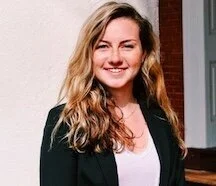In 2017, the driving ban was lifted for Saudi women. However, the women who vocally protested the ban have been jailed, subjected months of torture and unable to communicate with their families.
Lina Al-Hathloul speaking about the imprisonment of her sister, Loujain. POMED. CC BY 2.0
June 24th, 2018 marked the first day women in Saudi Arabia could legally obtain drivers licenses, following an announcement by King Salman in September that women driving would be considered acceptable under sharia law. By March of 2019, more than 70,000 Saudi women had received a license. Under the interpretation of sharia law enforced by the Saudi government, women are effectively minors, subject to guardianship by their fathers, husbands, or even their sons should their husbands pass away or become otherwise unable to fulfill the role of guardian. Women must receive permission to enroll in school, open bank accounts, sign contracts, or acquire a passport, to name a few of the many restrictions women face under guardianship laws.
Regarding the announcement of the end of the driving ban, Eman al-Nafjan writes in her blog, “Initially I was overwhelmed with my own powerlessness as a woman living in a patriarchal absolute monarchy. Were our efforts the reason the ban was lifted? Or was it a decision that had been made regardless of our struggles?” Dr. al-Nafjan is one of eleven women who was detained, subject to torture, solitary confinement, and threats of rape and death—more than once by Crown Prince Mohammed bin Salman himself—in 2018 as a result of their protests against the ban. The protests against the driving ban began in 1990, and have lead to the arrest, imprisonment, and severe punishment of many individuals. Of the eleven arrested in May-June 2018, some were released on bail. Al-Nafjan, as well as two other women, Loujain al-Hathloul and Nouf Abdulaziz, have borne the brunt of cruelty at the hands of the Saudi government, and as a result have received the most media attention. Their trials began in late March of 2019, however little is known of their current situation.
Nouf Abdulaziz, one of the women held in prison, writes in a letter sent during her detainment: “Hello my name is Nouf, and I am not a provoker, inciter nor a wrecker, nor a terrorist, nor a criminal nor a traitor.” The women imprisoned have sought justice for their fellow women, and we must honor their work by seeking justice on their behalf. There exists a clear duplicity in the West’s reaction to these human rights violations: although outwardly supportive of human rights, the U.S., France, and the U.K. have been complicit in the Saudi regime’s actions by maintaining close economic and security ties with Saudi Arabia. At the end of her letter, Abdulaziz implores her readers: “if what is happening does not please you, help our people to see clearly that our sister in the homeland is mistreated and she does not deserve other than her freedom, to maintain her dignity and to have the warmth in her parents [sic] arms, that has been taken away from her.” Many human rights organizations have spoken up on behalf of these activists, and Abdulzaziz, al-Hathloul, and al-Nafjan were awarded the 2019 PEN Freedom to Write Award for their work.
In this vein, Amnesty International marked May 2018-May 2019 a “year of shame for Saudi Arabia” due especially to its treatment of women’s rights activists and the assassination of Jamal Khashoggi, a dissident Saudi journalist. Although Crown Prince Salman, accepting the position of Crown Prince in 2017, labeled himself a reformer, he immediately launched a campaign to repress dissenters of the regime. In this way, the worries expressed by Nafjan were prescient: the Saudi government lifted the driving ban in an effort to improve international opinion, as well as increase the number of women working in Saudi Arabia’s flagging private sector, not with genuine progressive intent. Those who most vehemently spoke up for the rights of women were made examples of for other dissenters. While ultimately a victory for the greater female Saudi population, the patriarchal regime insisted upon a last word—in the form of human rights violations against the very women who created the momentum for the lifting of the ban.
HALLIE GRIFFITHS is an undergraduate at the University of Virginia studying Foreign Affairs and Spanish. After graduation, she hopes to apply her passion for travel and social action toward a career in intelligence and policy analysis. Outside of the classroom, she can be found, quite literally, outside: backpacking, rock climbing, or skiing with her friends.


